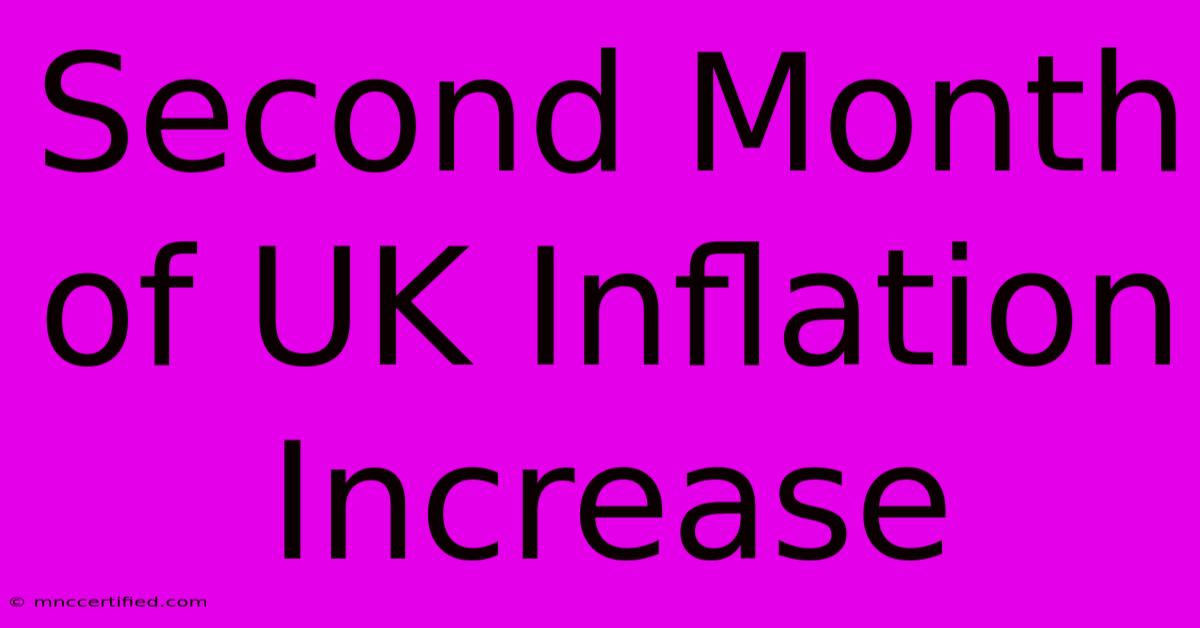Second Month Of UK Inflation Increase

Table of Contents
Second Month of UK Inflation Increase: A Deeper Dive into the Cost of Living Crisis
The UK is grappling with a persistent cost of living crisis, marked by a concerning trend: inflation has risen for a second consecutive month. This isn't just a headline; it's a deeply felt reality impacting households across the nation. This article delves into the reasons behind this concerning trend, explores its wider implications, and considers potential solutions.
Understanding the Second Month of Inflation Rise
The latest figures paint a stark picture. Inflation, measured by the Consumer Prices Index (CPI), has increased for the second month running, adding further pressure on already stretched household budgets. This sustained increase signals a more entrenched inflationary problem than a temporary blip. Understanding the why is crucial to addressing the issue effectively.
Key Factors Driving Inflation
Several interconnected factors contribute to this persistent inflation:
-
Energy Prices: Soaring energy costs remain a primary driver. The ongoing global energy crisis, exacerbated by the war in Ukraine, continues to impact UK households and businesses, pushing up prices across the board. This is a significant factor contributing to the second month of inflation increase.
-
Supply Chain Disruptions: Although easing slightly, global supply chain issues persist. Delays and shortages continue to affect the availability of goods, driving up prices due to increased scarcity. This is a long-term issue that continues to fuel UK inflation.
-
Wage Growth: While wages are rising, they aren't keeping pace with inflation. This wage-price spiral creates a vicious cycle, where rising prices necessitate higher wages, leading to further inflationary pressure. This disparity between wage growth and inflation is a major contributing factor to the second month of inflation figures.
-
Food Prices: Food inflation remains stubbornly high, impacting lower-income households disproportionately. Increased energy costs, supply chain disruptions, and adverse weather conditions all contribute to the elevated cost of essential food items. This further exacerbates the already challenging cost of living crisis in the UK.
The Wider Implications of Persistent Inflation
The consequences of a sustained increase in inflation extend far beyond rising prices at the supermarket.
-
Reduced Consumer Spending: As prices rise and real wages stagnate, consumers are forced to cut back on spending, impacting economic growth. This decreased consumer confidence can lead to a slowdown in economic activity.
-
Increased Poverty: The cost of living crisis is disproportionately affecting vulnerable households. Rising prices for essential goods and services push more people into poverty and deepen existing inequalities.
-
Increased Interest Rates: To combat inflation, the Bank of England is likely to continue raising interest rates. While this can help control inflation in the long term, it also increases borrowing costs for individuals and businesses, potentially slowing economic growth.
Potential Solutions and Mitigation Strategies
Addressing this complex issue requires a multifaceted approach:
-
Targeted Support for Vulnerable Households: The government needs to implement effective measures to support low-income families struggling with the rising cost of living. This could include increased benefits, energy bill rebates, or other forms of targeted financial assistance.
-
Investment in Renewable Energy: Reducing reliance on volatile global energy markets is crucial. Investing in renewable energy sources and improving energy efficiency can help alleviate pressure on energy prices.
-
Strengthening Supply Chains: Improving the resilience of UK supply chains can mitigate the impact of future disruptions. This involves diversifying sourcing, investing in domestic production, and promoting greater supply chain transparency.
-
Long-term Economic Planning: A comprehensive strategy is needed to address the root causes of inflation and promote sustainable, inclusive economic growth. This requires collaboration between government, businesses, and individuals.
Conclusion: Navigating the UK's Inflationary Challenge
The second month of UK inflation increase underscores the severity of the ongoing cost of living crisis. Addressing this challenge requires a concerted effort from all stakeholders, focusing on both short-term relief measures and long-term structural reforms. Failure to act decisively will have profound and lasting consequences for the UK economy and its citizens. Further monitoring of inflation figures and their impact on various sectors is essential. The coming months will be crucial in determining the trajectory of this persistent economic challenge.

Thank you for visiting our website wich cover about Second Month Of UK Inflation Increase. We hope the information provided has been useful to you. Feel free to contact us if you have any questions or need further assistance. See you next time and dont miss to bookmark.
Featured Posts
-
Mc Gregor Paul Boxing Match Confirmed
Dec 18, 2024
-
Cavendish Celebrated Isle Of Man Stamps
Dec 18, 2024
-
Skibidi Toilet Fortnite Collaboration
Dec 18, 2024
-
Connolly Beats Aoc Generational Shift Stalls
Dec 18, 2024
-
Keely Jenny Trevor Complete Sports Trio
Dec 18, 2024